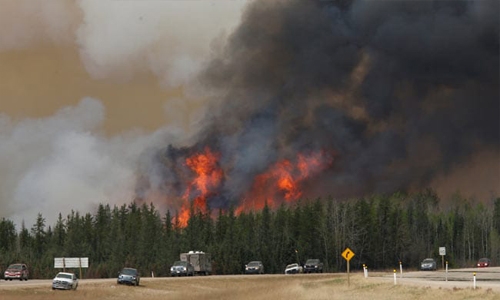Canada wildfire: Army on standby to evacuate towns threatened by blaze
AFP | Ottawa
The Daily Tribune – www.newsofbahrain.com
Ottawa prepared Friday to send military aircraft and other help to evacuate towns and fight more than 100 wildfires in western Canada fueled by a record-smashing heatwave.
According to wildfire officials, at least 152 fires were active in British Columbia, 89 of them sparked in the last two days. Most were caused by lightning strikes.
The fires were located north of the city of Kamloops, 350 kilometres (217 miles) northeast of Vancouver.
Experts believe the heatwave, which has triggered extreme heat alerts in areas where millions of people live, is caused by global warming. The heat has killed more than 700 people in Canada and at least 16 in the United States.
Prime Minister Justin Trudeau met Friday afternoon with an incident response group that included several ministers. He said he had already spoken with British Columbia's premier, as well as local mayors and indigenous chiefs in communities under threat.
"We will be there to help," he told a news conference.
The response group announced it would set up an operations centre in Edmonton, where armed forces will be able to provide logistical support. Military aircraft were also deployed to help.
"The dry conditions and the extreme heat in British Columbia are unprecedented," said Public Safety Minister Bill Blair. "These wildfires show that we are in the earliest stages of what promises to be a long and challenging summer."
Roughly 1,000 people have already fled the wildfires in British Columbia, and authorities are searching for many who have gone missing.
The village of Lytton, 250 kilometres (155 miles) northeast of Vancouver, was evacuated Wednesday night because of a fire that flared up suddenly and spread quickly. Nearly 90 per cent of the village was torched, according to Brad Vis, an MP for the area.
The fire came a day after the village set a Canadian record-high temperature on Tuesday of 49.6 degrees Celsius (121 degrees Fahrenheit).
"I cannot stress enough how extreme the fire risk is at this time in almost every part of British Columbia and I urge British Columbians to listen carefully to officials in your communities and follow those directions," provincial Premier John Horgan said.
Concerning heat
The heatwave continued to spread across central Canada on Friday. In addition to British Columbia, heat wave warnings were issued for the provinces of Alberta, Saskatchewan and Manitoba, as well as parts of the Northwest Territories and northern Ontario.
"A dangerous long duration heat wave will continue" and will bring "very warm temperatures over the next couple of days," Environment Canada warned in bulletins for British Columbia.
"The duration of this heat wave is concerning as there is little relief at night with elevated overnight temperatures."
Late Friday, the British Columbia province medical examiner's office said there had been 719 deaths in the past week, "three times more" than the average number of deaths recorded over this period under normal circumstances.
"It is believed likely the extreme weather BC has experienced in the past week is a significant contributing factor to the increased number of deaths," Lisa Lapointe, the province's chief coroner, said in a statement.
Lytton resident Jeff Chapman told the CBC he witnessed his parents die in the fire that engulfed the town.
With only minutes to react, the elderly couple sought shelter from the smoke and flames in a trench in their backyard, as Chapman ran for safety at nearby rail tracks. From that vantage, he said he saw the fires sweep across and destroy most of the town.
"Today our thoughts are mostly with families that are grieving, that are facing terrible loss," said Trudeau during his press conference.
British Columbia also warned Friday of flooding from melting mountain snow caps and glaciers under the heat dome, which occurs when hot air is trapped by high pressure fronts, heating the ground.
Farther south, the US states of Washington and Oregon have also been sweltering under record-high temperatures this week.
Hundreds of firefighters scrambled Friday to contain three wildfires in drought-hit northern California that have scorched nearly 40,000 acres, including a popular tourist lake preparing to welcome hordes of visitors for the July 4 holiday weekend.
Evacuation orders were in place along stretches of Shasta Lake -- a camping and boating hotspot 160 kilometers south of the Oregon border -- as soaring temperatures and high winds spur blazes at a relatively early stage in the region's fire season.
Around 40 structures were destroyed, including at least half a dozen homes near the town of Lakehead, an AFP photographer said.
More than 500 lightning strikes were recorded in California in the last 24 hours, threatening to cause more fires.
Related Posts

